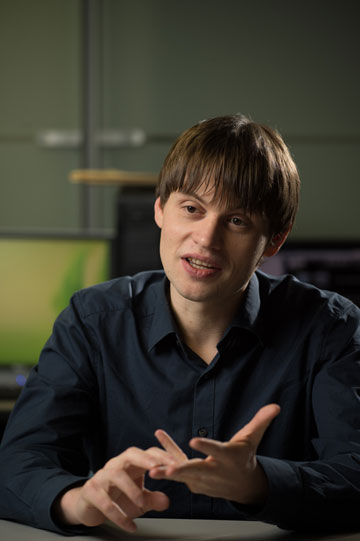
Alexander Plopski
Assistant ProfessorNara Institute of Science and Technology
Interview : Feb. 19, 2018
The Ambitious Researcher Talks About His Views on the Future of Augmented Reality
The math-loving boy now seeks solutions to problems about augmented reality - a technology that promises a wide range of potential applications - and hopes to make a big dent in the future.
Driven by a desire to find answers
 Back in his school days, Dr. Plopski loved math, which is "logical and like a big puzzle to solve." "I want to find answers to interesting questions," he says firmly. "That's what first drove me to do research."
Back in his school days, Dr. Plopski loved math, which is "logical and like a big puzzle to solve." "I want to find answers to interesting questions," he says firmly. "That's what first drove me to do research."
Showing enthusiasm for a wide range of things, from board games like chess and Go to water polo and volleyball, the boy focused on one thing and then moved on to the next. "I wasn't a troublemaker," he chuckles. "I stayed at home playing a lot of computer games and my mom was not happy about it."
An encounter with computer science through his father inspired the boy to be a researcher. When graduating from high school, he wondered if he should go into mathematics or computer science. He ultimately chose the latter, where he could do both.
Digging deeper
Dr. Plopski still remembers the day in his childhood when he visited his grandfather in the hospital. A man gave the boy a math question. "Oh, math? Of course, I can understand this," the boy thought to himself. However, there was a small trick to the question and he got it completely wrong. The boy learned that "there are things that are below the surface" and that "you should always dig a little bit deeper." The lesson now helps him take a look at what else he can do in his research.
Curiosity, cooperativeness, and hard work
Dr. Plopski mentions his curiosity and broad background as his strong points. Born in Moldova and educated in Germany, the researcher has pursued his career in Japan and the U.S. "I'd like to think I'm working hard," he says with a modest smile. "One of my strong points is working with other people. We have many collaborations going on, and we have a number of publications that came out of these collaborations." When he is feeling stuck with his research, what helps him the most is working with other researchers who help him come up with new ideas. Then, he tries to "think in a broader sense to better understand what [he's] doing."
Dr. Plopski believes that important qualities of researchers are being hard-working and open-minded, having a broad view, and being interested in challenging things. He names Stephen Hawking as one of the researchers he admires the most. "He didn't let the world decide what he should be. He didn't give up just because he was sick."
 Inspiration from everywhere
Inspiration from everywhere
Recently, he read The End of Hardware: Augmented Reality and Beyond by Rolf R. Hainich."One quote from the book that still stays with me is that 'many things must be reinvented many times,' " he says. Something that was invented but forgotten due to its unfeasibility may become viable in future decades. "So, sometimes we have to look back into the past to find ways to move forward."
He loves sci-fi novels and movies. "There are probably a lot of things we scientists can learn from artists because they look at the world in a different manner," he suggests. As a researcher, he wonders "Can this actually be applied in the real world?" and if so, how to achieve it.
Influence on his students
"I moved a lot while growing up, so I haven't really had a culture shock," Dr. Plopski says with a grin. He motivates his students by saying, "Go abroad. Go see how people study there and bring this knowledge back and apply it to your own research."
The German assistant professor shares his own experience with his students to help them broaden their view. "What I'd like my students to do the most," he says, "is to learn how to develop themselves and do the same research without my supervision and to teach others how to do research."
Making a big dent
Applications of augmented reality range from medical treatment and exercise guidance to entertainment. One of Dr. Plopski's great motivations for research is to tackle a problem so that he can eliminate it and make it possible for people to use the solution, create something new, and make their life easier. "I hope that in the future I can find some of our work being used in actual applications, like a store or elderly home," he says with sparkling eyes. "I remember hearing that the greatest achievement of a Ph.D. is to make a small dent in our knowledge of a subject. This shows how vast our knowledge is and that it is not easy to expand it. I hope to make a big dent in the future."

 Home
Home